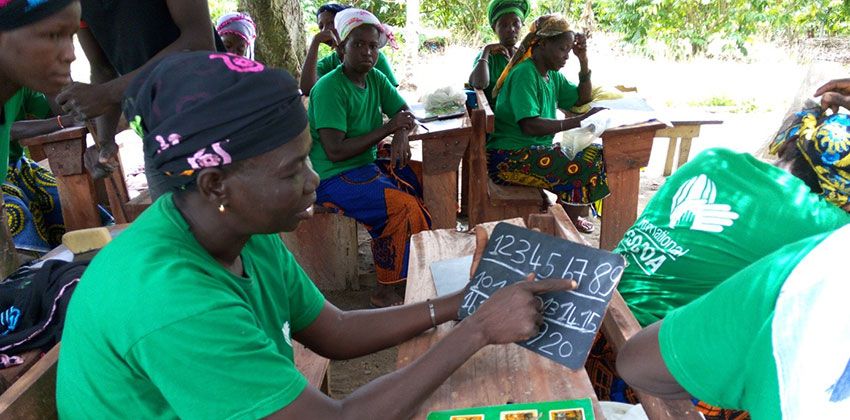Under the roof of the Jacobs Foundation’s Transforming Education in Cocoa Communities (TRECC) program, Mondelēz International, Nestlé, Barry Callebaut, and Mars will reach out to at least 16,000 children and youth and 72,000 adults in Ivory Coast over the next three years to provide quality education, empower women, and assure child labor remediation. In this newsletter, we feature a particular initiative by Nestlé and their project to improve women’s literacy and numeracy levels, as implemented by the International Cocoa Initiative (ICI).
In an agricultural settlement in south-east Ivory Coast, 112 km away from the town of Aboisso, a group of men and women have set up houses within farming fields where rice, cassava, and bananas are farmed for local consumption and cocoa, coffee, palm, and rubber are grown for export. Cocoa-producing families sell their goods, through their cooperative, to Nestlé.
Women solve issues together
Living and working in this camp entails many challenges, which is why the women of the community have come together and created an association called “Débaya dèmin – Assistance to children” to better face them. The women discuss and make plans together to solve issues regarding the work in the fields, the selling of goods, or other difficulties they come across at home. With the nearest school being some 10 km away, education and enrolment for their children is a major challenge for the community. The women have therefore decided to take matters into their own hands: they want to learn themselves so that they can teach their own children.
Through “Débaya dèmin”, these women requested the help of Nestlé to go back to school. Together with the Jacobs Foundation and ICI, a numeracy and literacy program was set up. Thirty women between the ages of 25 and 55 signed up for it and the entire community helped build a shed where lessons take place. A young tutor in his last year of high school was taken on board and trained by the implementing organization to teach lessons three times per week.
Independence to sell products at local markets
Of those who initially enrolled, 20 women can now comfortably read simple sentences and make basic calculations; this has granted some of them the independence and confidence to successfully sell their products at local markets. Many have managed to use mobile phones to make calls and send messages for the first time. Furthermore, the school program covered several themes of interest of the women, such as disease prevention and health practices.
TRECC’s initiatives on literacy training for adult women farmers can positively influence family well-being and the learning perspectives of their children. Through the Nestlé Cocoa Plan and partnership with TRECC, Nestlé aims to improve the literacy and numeracy levels of mothers and children and ultimately reduce child labor. This educational and women empowerment initiative, over a span of three years, aims to engage a total of 900 women across the country. Year one has recently been completed and the program is currently being implemented in 10 communities with 216 women.
Hope to improve the prospects for families
Towards these efforts, Nestlé’s partner ICI has, within the TRECC partnership, also set up informal bridging classes for out-of-school children ages 9-13 and provided additional support for children attending school but at risk of dropping out, targeting a total of 2700 children. In total, 753 children are currently engaged or have completed that program. Darrell High, Cocoa Manager for Nestlé, states: “Nestlé is proud to partner with ICI, as part of the Jacobs Foundation’s TRECC program, to deliver much needed literacy and numeracy training for children and mothers in cocoa communities. By improving educational support, we hope to improve the prospects for families and further reduce the likelihood of child labor taking place.”
The goal by the year 2020 is for at least 50 percent of the industry partners engaged under TRECC to enhance child, youth, and education policies and practices. By providing support for the government, our industrial partners, and local organizations, we also seek to ensure that rural communities have access to quality education beyond the involvement of the Jacobs Foundation.
